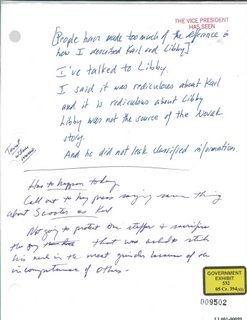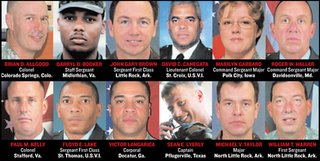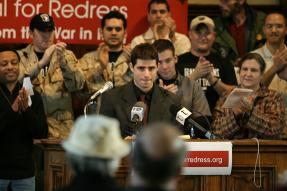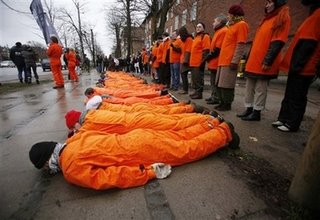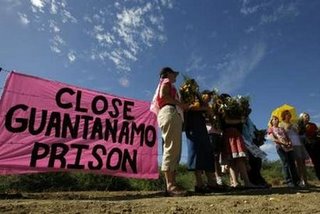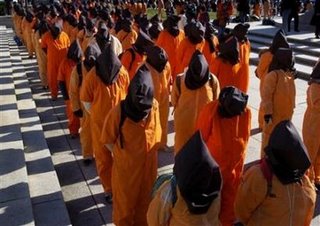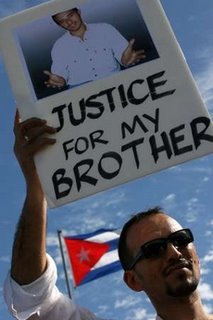Five years ago today, 20 shackled and blindfolded detainees were sent to the notorious Guantanamo prison camps. Since then, 773 prisoners have passed through the detention center, which is on the U.S. Naval base in southeastern Cuba. A total of 395 men are currently being held there because of alleged links to Al Qaeda and the Taliban, including 85 who have been cleared for release. None of the detainees have been tried and none have any prospects of a fair hearing. Only 10 of the prisoners have been charged by the "Guantanamo process."
Yesterday on
Your Call, we did a show about the five-year anniversary of Guantanamo. I interviewed Vincent Warren, executive director of the
Center for Constitutional Rights, Jumana Musa, advocacy director of domestic human rights and international justice at
Amnesty International USA,
Moazzam Begg, a former Guantanamo detainee and author of the book, "
Enemy Combatant: My Imprisonment at Guantanamo, Bagram, and Kandahar," and Dr. Steve Xenakis, retired U.S. Army brigadier general and department head at the Psychiatric Institute of Washington. The show is
archived.
The prisoners at Guantanamo are repeatedly beaten, raped, forced to maintain very stressful positions, and subjected to prolonged sleep deprivation, months of isolation, extreme temperatures, and mock executions.
Reading about torture is one thing; seeing it is another experience altogether. To see what the Bush administration is doing to innocent men from around the world, watch "
The Road to Guantanamo," a deeply disturbing film about three young British men who were tortured and abused at Guantanamo Bay for more than two years. They were eventually released without charge.
There have been
three suicides among prisoners and hundreds have been
force-fed to keep them alive during intermittent hunger strikes. The Department of Defense has acknowledged 41 suicide attempts among 29 prisoners.
Jumah Al-Dossari, a 33-year-old citizen of Bahrain, has been held at Guantanamo since 2002. In a
letter to his attorneys, he writes, "At Guantanamo, soldiers have assaulted me, placed me in solitary confinement, threatened to kill me, threatened to kill my daughter and told me I will stay in Cuba for the rest of my life. They have deprived me of sleep, forced me to listen to extremely loud music and shined intense lights in my face. They have placed me in cold rooms for hours without food, drink or the ability to go to the bathroom or wash for prayers. They have wrapped me in the Israeli flag and told me there is a holy war between the Cross and the Star of David on one hand and the Crescent on the other. They have beaten me unconscious.
I would rather die than stay here forever, and I have tried to commit suicide many times. The purpose of Guantanamo is to destroy people, and I have been destroyed. I am hopeless because our voices are not heard from the depths of the detention center. "
The camp has been criticized around the world for its detainment of prisoners without trial. The U.S. administration said the prisoners were not entitled to the protections of the Geneva Conventions, but on June 19, 2006, the U.S. Supreme Court ruled against that claim.
Today, activists around the world will be demonstrating for the closure of the base.
Asif Iqbal, one of the men featured in "The Road to Guantanamo," is back in Cuba denouncing the abuses. Amnesty International and others will participate in demonstrations in Australia, Italy, Japan, Paraguay, Spain, Tunisia, the United Kingdom, and the United States. To take part in an action near you,
click here.
While we talk about the torture methods being used by the United States, as a society, we rarely discuss their devastating impacts. In 1957, after French soldiers forced water directly and deeply into the lungs of
French journalist Henri Alleg during the Battle for Algiers, he wrote a book about his ordeal and named his torturers. He wrote, "I tried, by contracting my throat, to take in as little water as possible to resist suffocation by keeping air in my lungs for as long as I could. But I couldn't hold on for more than a few moments. I had the impression of drowning, and a terrible agony, that of death itself, took possession of me."
That chilling description turned the French people against both torture and the Algerian war.
So what's it going to take to turn the American people against torture?
Here are comments from a few of the protesters who've been directly impacted by Guantanamo:
Zohra Zewawi, the mother of detainee British citizen Omar Dehayes, traveled from the United Arab Emirates with another son, Taher Deghayes, to join the protest [in Cuba]. She says her son had been tortured and blinded in one eye since he was imprisoned in September 2002 and still has not been charged or tried.
During the conference, peace delegation member Adele Welty, who lost her firefighter son in the Sept. 11, 2001, terror attacks, expressed empathy with Zewawi and other mothers of men held at Guantanamo prison.
Welty said that in the case of her son Timothy, "I have been assured that it was over quickly, that he did not feel the tons of concrete that tore his body apart.
"But for five years, (the inmates') mothers have lived with the images of them being torn apart from torture," Welty said.
Let's hope comments like these and today's worldwide actions planned over the next few days
raise the awareness needed to pressure the U.S. government to shut down these torture prisons.


